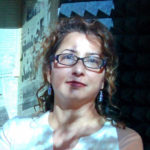Mahmood Karimi Hakak, MFA, SED, is a poet author, translator and theatre and film artist whose artistic and scholarly works are focused on peacebuilding through the arts. He is the founder and CEO of Café Dialogue LLC, Artistic Director of Mahak International Arts Inc., and Founder and President of Free Culture Invisible (Former Festival Cinema Invisible) LLC. Karimi Hakak’s artistic works include over 70 stage and screen productions in the U.S., Europe and his native Iran. His films and plays have received number of international merits and awards including Best Director (1979); Critics’ Choice (1999 and 2007); and ACTF (2003, 2008 & 2014).
Prior to his migration to the U.S. in 1976, and while studying theatre at Tehran University, Karimi Hakak served as Director of Courses for the Academy of Language in Tehran, where he wrote nine textbooks on teaching Persian to non-natives. In 1992, while teaching at Towson University, he traveled to Iran for a short family visit, but his encounter with the Iranian youth and their passionate struggle for a civil society made him decide to remain in Iran. Following seven years of attempting to stage a play in his native land, Karimi Hakak was finally issued permission to stage his own translation of Shakespeare’s A Midsummer Night’s Dream. This play, however, was raided and closed down on its 4th public performance and Karimi Hakak was accused of Raping the Public’s Innocence and summoned to the Court of Islamic Guidance, (daadgah-e ershad Islami). The ensuing death threats against him and his 2 years old twins, forced the Hakak family to leave Iran in 1999. The story of this production is reflected in an article entitled Exiled to Freedom (The Drama Review, Winter 2003) and a documentary film, Dream Interrupted (2001).
Mahmood’s theatre and films explores the ideas of intercultural dialogue and peacebuilding. His 1979 production of Passion of Ashura aimed at alarming his country against a rushed revolution, where one dictator may replace another. In 1991 he created Seven Stages: A Symphony in Seven Movements as a dialogue between Forough Farrokhzad, Jalal-al-Din Rumi, and seven American youth. Selection from Rumi’s Mathnavi (2000) employed actors from seven different nationalities, each speaking in their native tongue on stage. In his 2001 adaptation Six Characters in Search of An Author, Pirandello’s characters appear through the ruins of the Twin Towers, forcing the attackers and the attacked to face each other. His 2008 adaptation of Aeschylus’ The Persians enforced the devastating aftermath of American military industrial expansion as evident in the Iraq war. In HamletIRAN (2011), Mahmood placed Shakespeare’s prince within the Iranian Green Movement of 2009, encouraging him to appreciate the necessity of “each citizen one vote”. And, four year after his yearlong Fulbright Award, in 2014, Mahmood released a documentary film, The Glass Wall, as a conversation between Israeli and Palestinian theatre artists striving towards an artistic and suitable solution to the age long conflict.
Karimi Hakak, has published seven plays, two books of poetry, five translations from and into Persian, and numerous articles, reviews and interviews in both Persian and English. His translation of Hafez (with Bill Wolak), entitled Your Lover’s Beloved: 51 Ghazals by Hafez (CCC Press 2009) was nominated for the Best Translation of Poetry by American Literary Translators Association (ALTA) in 2010. He is a recipient of number of merits and awards, including three ACTF Merit Awards for Best Direction (2003, 2008, and 2011), The Raymond Kennedy Excellence in Scholarship Award (2005), and The Fulbright U.S. Scholar Award (2009-10).
Professor Karimi Hakak has taught at City University of New York, Towson, Southern Methodists, and Rutgers universities in America, University of Antwerp in Belgium, and Tehran, Azad, Soore, and Teacher’s Training Universities in Iran. Presently he serves as Professor of Creative Arts at Siena College in Upstate New York.

